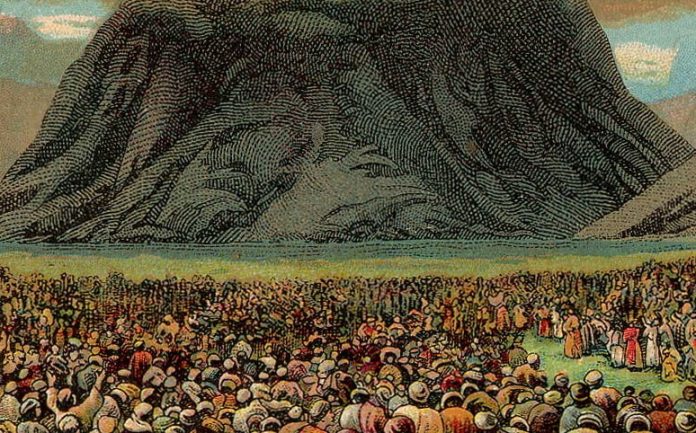

Operation Inspiration
I’ve heard that some time before one’s Bar or Bas Mitzvah, they’ve seen their bashert at least once. I’m not sure of the source of this, and when people come from different countries and continents, I find it especially hard to believe. However, since all the souls of Klal Yisrael were at Har Sinai, it’s possible that our neshamos saw our destined mate at that time. In fact, there’s even a program for singles called, “Saw You at Sinai,” which builds on this theme.
However, I am not here to talk about singles per se right now, but about the concept of having seen individuals “at Sinai.” As I imagine it, it’s more about recognizing the inherent greatness in others and acknowledging that this person was at Har Sinai and heard Hashem speak to him or her. Can you imagine how great someone must be for Hashem to speak to them? And He spoke to every Jew, which means every one is great. That’s puts a lot of things into perspective.
They say there are two types of people. Those who walk into a room and say, “Here I am!” and those who enter and say, “Ah! There you are!” The difference, of course, is in the direction of the admiration. One person wants you to recognize all their good attributes. They want you to see how clever, kind, put-together or whatever else they feel they are. But they don’t realize what they’re missing.
The other one, who sees another person and is excited to speak to them, to express admiration and acknowledge the inherent greatness of the person, is quite another story. You see, the fellow who thinks highly of himself, but needs the accolades of others to confirm his theories, is actually less sure of his stature than the person who doesn’t need to hear his praises sung. The one who is impressed with others, though, looks up to them and this inspires them to even greater heights.
The Ramban, in his famous letter, advises his son (and us) to see others as better than ourselves. If they are wealthier than us, we have an obligation to honor them. (This goes back to R’ Yehuda HaNasi, who would “honor wealthy people.” He did this so people would honor him for his wealth, and not his Torah. He felt it was improper to be honored for his Torah knowledge.) If the person is not as wealthy or as knowledgeable as we are, then we should recognize that when they sin, they are likely unwitting, while we are intentionally sinning. This advice is part of achieving the humility one should strive for.
So, let’s focus on what we’re saying. Each person has wonderful aspects and facets to their soul and personality. Each has the seeds of greatness implanted in them by Hashem. The wise person will seek them out, point them out to the person himself, and thereby become a partner in their greatness. We know that a person is not jealous of his child or student. That’s because their success is a reflection of the effort they put into the youth, and the one who helped them grow can claim that success as their own, as well. In fact, they don’t even have to claim it, because others recognize it.
Imagine if you’d befriended someone younger than you in school. You were the one she spoke to about her dreams, her goals, her fears, and you were someone she looked up to, like a big sister. Then, when she gets married, you go to the wedding, and she pulls you in to dance with her in the inner circle. She’s the center of attention; all eyes are on her. But you’re not jealous, because you know you were part of the journey to get her where she is today.
If that little girl you helped guide grew to be an inspirational speaker, a Rebbetzin, or a doctor who saved lives, you’d be gratified, knowing you had a share in making that possible. And you can do it time and time again.
When you meet people, or see people you know already, be enthused about seeing them. Don’t roll your eyes in annoyance. Instead, look at them and see the G-dliness, the potential. Tell yourself, “This person stood at Har Sinai and got two crowns for saying Naaseh V’Nishma! There’s a lot of greatness to be found here.” If you do that, you’ll be pointing the way for their own rise and, more than that, you’ll be making them feel valued, smart, honorable, and honor-bound to fulfill the mission they got millennia ago – when they stood with you, at Sinai.
© 2022 – All Rights Reserved
Did you enjoy this column? Feedback is welcome and appreciated. E-mail info@JewishSpeechWriter.com to share your thoughts. You never know when you may be the lamp that enlightens someone else.





